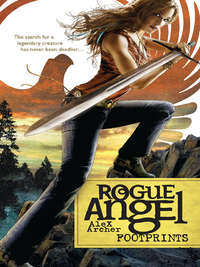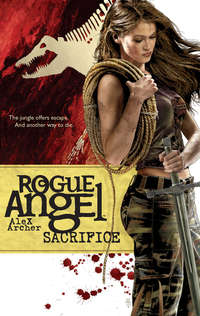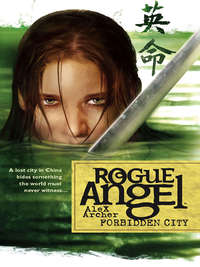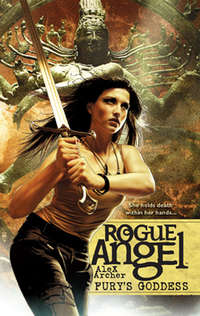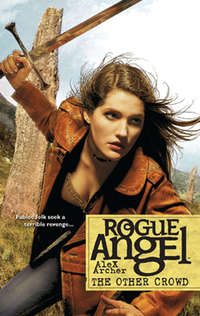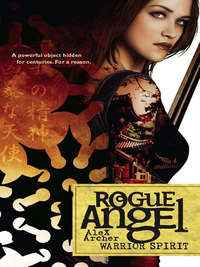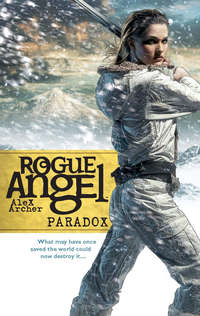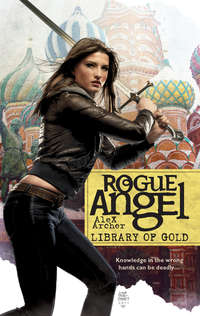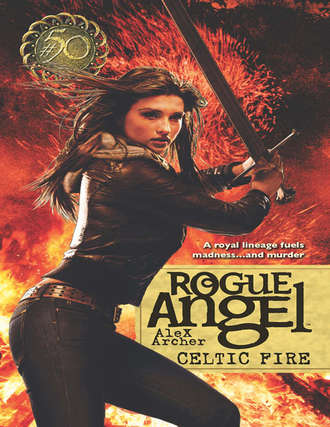
Полная версия
Celtic Fire
What was doubly interesting about Caerleon, though, was that it was also one of the possible sites of Camelot, the fabled court of King Arthur, according to the writing of Geoffrey of Monmouth in the twelfth century. There was also a reference to Arthur fighting a battle against the Romans in the “City of the Legion” according to Nennius in his Historia Brittonum; this could easily have been Caerleon, home of the Second Augustan legion. This was why she loved archaeology; it was more than just digging things out of the ground. It was all about sifting through the clues buried in early writings and using them to locate important lost sites. It was more than just history. It was akin to lore and legend in the absolute nerdiest sense.
Annja hadn’t even realized her breakfast had been placed in front of her as she had been so caught up in her thoughts. She wouldn’t reach the small Welsh town until tomorrow, but she had given herself a few days to stay. She wanted to make sure she saw everything there was to see in case the chance to return didn’t come around again.
She picked at the food without any real appetite and drained the orange juice. There would be plenty of time to grab something else to eat later; she’d promised herself a traditional English breakfast of sausage, bacon, eggs, potatoes, beans and fried tomatoes. She knew a great little greasy spoon just around the corner from the station. The locals called the specialty “the heart attack on a plate,” but it was nothing compared to some of the stuff they served back home.
She looked through her papers one last time before packing them away for landing, studying the photographs and maps of the area around Caerleon. She skipped past the pages on Caerphilly, slipping those back into her folder. There were another half a dozen folios like this in her case—the other places she planned on visiting on her trip—but they could wait.
When the plane finally touched down she was ready for the shuffle-race to the exit with everyone standing up and crowding the aisles long before the cabin doors were open.
By the time she’d collected her luggage from the baggage carousel, and gotten through customs and passport control, the clouds had begun to break up. It wasn’t exactly glorious out, but it was a good morning and it looked like it was going to be a better day, which meant the drive into Wales should be easy, as long as tiredness didn’t mean sleeping in a lay-by somewhere near the River Severn.
Annja claimed a hire car from the desk, then went on an expedition to find it. She scoured parking bays that went on forever in a recursive loop of identical hire cars until a click of the key fob resulted in a flicker of lights identifying her ride.
She sat inside the car for a few minutes, trying to familiarize herself with the right-hand-drive position before pulling away. She repeated, “They drive on the left” like a holy mantra as if she really needed any reminding from the minute she hit the open road of the M25.
It felt good to be driving once she got to the motorway rather than crawling through the airport’s one-way system. She rolled one shoulder after the other to free it from the kinks that still lay in her muscles from the flight.
The sun was behind her and the steady flow of traffic away from London moved at an even pace with vehicles peeling off and others joining at every junction.
In an ideal world she would have made the journey a little more slowly, but her speed was dictated by the cars and lorries around her. Annja was caught in a stream where each vehicle moved at the same speed as the one in front so she cranked the radio up, choosing volume over taste, and wound the window down. It was summer, after all.
Eventually the discomfort of sitting still for so long after the flight left her with no choice but to pull off at a motorway services area and go in search of coffee and the chance to stretch her legs. The decor was bad, the coffee was worse. She wound up getting back in the car and heading toward the motorway less than fifteen minutes after she’d pulled into the rest stop. The next signpost promised that Cardiff was less than fifty miles away. The turnoff for Caerleon would come some time before that.
Chapter 4
An engine fired up beside her, gunned quickly into life and was followed by the crunch of tires on gravel as the car pulled away. Awena knew that it was safe to move at last. She’d lain still and silent, listening to the wail of the museum alarm as it carried on into the night air, and then drifted off after it fell silent, one hand on the stone artifact she had liberated from the glass case. She liked to think that she’d saved it from being transferred to some dusty old vault somewhere where it would have been hidden away until doomsday, completely forgotten about. That would have been a bigger crime than anything she’d done.
She hadn’t realized what she’d been looking at the first time she’d laid eyes on the exhibit—why would she have?—but there was something about it that had brought her back to it again and again, until she was finally convinced that it was mislabeled. The card had described it as a quern—a hand-grinding stone for grain—but it clearly wasn’t; it was too large and too heavy to be one of those. Once upon a time she might have pointed the mistake out to one of the staff to let them know how clever she was and basically how stupid they were for screwing it up. She’d grown up a lot since the days wasted in museums with her easily embarrassed twin, Geraint, who frequently turned a darker shade of red than their flame-red hair while he tried to pretend he had no idea who she was. It never worked. Now, thankfully, she was comfortable with the idea that she was the sharpest person in any given room she walked into. It wasn’t arrogance; it was just a fact. It didn’t matter who else was there, Awena was ferociously intelligent.
Once the sounds of the car had faded into the distance she eased herself up a little to scope out the lane. A glance through the rear window revealed a blanket of mist across the rugby field, shrouding it with a soft white in the early-morning sun. There was no sign of anyone else around. She’d reached the point of no return. If she waited too much longer to make her move, traffic to the heritage site would increase and it’d be difficult to slip out of the car to stretch the kinks out before getting back into the driver’s seat without anyone noticing.
She opened the door.
The air was colder than she’d expected. She used the discarded blanket to cover the stone. A dog came bounding toward her along the lane, its owner calling after it, but it wasn’t slowing down. It raced with its tongue lolling between open jaws, full of excitement. Awena wasn’t afraid of dogs, but it was the kind of encounter the mutt’s owner would remember, and the last thing she wanted was to be memorable. With the dog still thirty feet away, she slipped back behind the wheel and slammed the door. The confused animal stopped dead in its tracks and stared at her for a moment, wounded, like it couldn’t understand why she didn’t want to stop and play with it, then looked back in the direction it had come from before it took off into the mist-shrouded field.
Awena waited a moment before starting the car, watching the dog’s owner shrug helplessly and follow after it into the field, then pulled away.
The streets were dead. She reached the end of the lane, putting on the blinkers to indicate she was turning right. She couldn’t see any policemen outside the museum, though she had half expected a guard to have been posted.
Alongside the building where her Land Rover had parked she saw a white van.
She pulled out into the road, driving slowly and straining to catch a glimpse of the writing on the side of the van: a twenty-four-hour locksmith. She smiled. Typical—shut the stable door after the horse has well and truly bolted.
She followed the road as it arced right, curving around a big old Gothic school building, and took her beyond the police station. There was no sign of anyone coming or going. Any panic or rush of excitement at the break-in and the resultant flurry of activity had died down and life had settled back into the normality of its daily routine.
Awena turned left at the end of the street and followed the road through a series of villages that fed one into the next. Eventually, she picked up a faster road and was able to put her foot down on the gas.
She allowed herself to laugh as she felt the rush of speed and the excitement of her plan falling into place. She’d done it. Simple as that. She’d won. She couldn’t wait to show Geraint her trophy, even if he still had doubts about what it was that she had stolen. She’d just have to convince him. Awena desperately wanted to call her brother, even though the digits on the dashboard reminded her that it was barely 7:00 a.m. He wasn’t an early riser.
She’d almost forgotten that he’d stayed the night in London.
She was going to enjoy the look on his face when he laid his eyes on the treasure.
Like the old commercial said...priceless.
Chapter 5
The Welsh seemed intent on charging Annja to enter their country—or was it the English charging her for the luxury of leaving theirs? She wasn’t entirely sure, but it was the first time she could remember being charged to cross a border. Signs at the side of the sweeping bridge that carried traffic over the River Severn warned that tollbooths lay ahead, clearly marked with the cost for each type of vehicle. It’s highway robbery, she thought, and grinned at her own dumb joke.
Brake lights glowed in the distance; there was a long queue to the control booths taking the money.
Annja reached for her purse as she joined the back of one of several snakes of cars that had formed and pulled out a crisp ten-pound note fresh from the currency exchange office.
A quick glance to the left confirmed she was already on the far side of the river. To her right she could see the supports of a second, older-looking bridge.
Cars edged forward slowly, and as was the way with queues, some moved faster than others—which really meant all of them seemed to be moving faster than hers. As she neared the front, she realized that some of the booths were actually automated, self-service barriers while the queue that she was in relied on someone giving change.
The guy in the next car flashed a smile across the lanes to her, but Annja was more interested in the car ahead. It wasn’t that she didn’t like drawing grins from strangers; just like everyone else she found them flattering, and his smile did draw a smile from her, but she didn’t want him to see it and think he’d somehow made her day. She was contrary like that. Plus, his queue was moving faster than hers. He’d have another driver to flirt with in a moment.
Eventually her turn came. She smiled to the tired-looking teller, trading money for less money, and he raised the barrier with a snatch of something she didn’t understand but assumed was the Welsh equivalent of Have a nice day or Drive safe.
She pulled away as cars raced into the bottleneck of decreasing lanes, each driver looking to secure one of the three lanes ahead of them before it became a mad scramble. The merging was surprisingly smooth, all things considered, with cars filtering in and drivers allowing one another enough space for safety. It wouldn’t have been like that back home, she thought, letting a black Jaguar XJS slip into the lane ahead of her. It was only when the traffic had eased to a steady fifty-five pushing sixty that she realized how tightly she’d been gripping the wheel. Annja relaxed her grip and eased back on the accelerator, signaling to move into the slower traffic of the left-hand lane.
She glanced across to see that the car beside her was the same guy who had flashed her a smile in the queue at the tollbooth. He slowed down and gave her room to pull across in front of him. This time she smiled back.
The off ramp she needed came upon her sooner than she’d anticipated, and almost disappeared into the rearview mirror before she’d seen it. It took a bit of emergency maneuvering, but she managed to cut across the chevrons painted across the road and up onto the ramp before she ran out of room, half expecting the driver behind to hit his horn in protest. But she saw the smiler was still behind her, still smiling.
It was just her luck he was turning off the motorway, too.
Annja followed the brown signs with the outline of a Roman helmet, indicating a tourist attraction, as the road took her through the outskirts of the city of Newport with its run-down houses and seen-better-days factories, before steering the car out into the countryside proper. The short journey from the motorway to the outskirts of Caerleon only took ten minutes or so, but the change of pace with the speed limit dropping by thirty miles per hour made it feel like so much longer.
The approach offered a spectacular view of the town and castle. An old stone bridge too narrow for two cars to pass side by side spanned the River Usk before the road swept right to a wonderful holly-and-ivy country pub. The place had a thatched roof that made it look like something that had slipped through a crack in time from the 1800s. It stood invitingly on the river’s bank, promising refreshment and a nice warm hearth. Just the sight of it brought on a sudden thirst and gnawing hunger so Annja decided to take care of both, even though she was only a short distance from her hotel.
The gently swaying sign had the gold-painted words Miller’s Arms and a crest. A smaller blue plate on the wall explained that the building was originally a sixteenth century coaching inn and lots of the oldest features seemed to have survived into its new life. It took Annja a few minutes to get used to the landlord’s accent as he offered her his very proud spiel, but after a while she found her mind singing along with the rise and fall of his speech.
“You from America, are you, then, me love?” he asked, pulling a bottle of water from one of the fridges behind the bar. She’d never heard anyone call her “me love” before; “my love” was more northern, but the “me” seemed slightly tortured. She smiled as he offered ice by holding a scoop over a plastic ice bucket but she declined.
“For my sins,” she said, taking a sip of the water, realizing just how thirsty she really was. The label on the bottle was in Welsh and seemingly unpronounceable, which she thought was cute. “Hope you won’t hold it against me.”
“We get quite a few of your sort through here over the summer, people coming to take a look at the ruins and stuff. That why you’re here?”
“That’s me.” She laughed. “Just another tourist.”
He reached to a dispenser on the side of the bar that was stuffed full of slightly faded leaflets about the various attractions and places of interest in the area and plucked a few of them out for her. “Then you might find these useful,” he said.
“You on a commission?” she joked as she glanced through them.
“Well, the museum is free, and so is the amphitheater, so it’s not going to make me rich. There’s a charge to go and look around the old Roman baths, but hard as I’ve tried to convince them, no backhanders have come my way.” He smiled again, showing he was joking, even if it wasn’t a very good one. “There should be one of their leaflets over there.” He pointed to another, larger rack that was perched on a low windowsill on the other side of the room.
Annja picked through the stack of leaflets he’d selected for her.
One was for the local museum, which was at the top of her list of places to visit, another about the work of Cadw, the body that looked after ancient monuments in Wales, and the third was a street map of the town. It was a decent selection; she’d already decided to examine them a little more closely while she sat with her drink.
Annja glanced down the small laminated menu on the bar, thought about asking what was good, then remembered something Roux had said about British cuisine—anything was good as long as it was brown. The Brits seemed to have a penchant for brown food, but she didn’t fancy a pie or battered fish or anything heavy, so she took a chance on a green salad.
“There’s a few tables free down by the river if you’d like to sit outside,” the landlord said as he wrote her order on a tiny pad of paper and tore the top sheet off. “I’ll bring your food out to you.”
“Sounds good,” she said, paying for the food and another bottle of water, then heading out into the sunshine. A haphazard arrangement of picnic tables and benches were set out on the grassy bank. There were a dozen large umbrellas fixed through the centers to provide shelter from the sun. Half of them were occupied; some with couples who were oblivious to anything but each other, others with couples who had clearly been together so long that they had little left to say to each other and others with men intent on filling every inch of space with empty beer glasses.
A mother fussed at a wasp that was buzzing around a small child in a buggy beside her. Annja thought that there was something about the scene that was so English but then corrected herself, remembering that Wales was very definitely not England and saying it was tantamount to a hate crime in some minds.
The water in the river seemed low, with steep mud banks on either side. She was staring at some kind of mud-wallowing bird she couldn’t name when the landlord appeared with her lunch. “Low tide,” he said as if reading her mind. “At high tide the flow slows down and the water level rises as it’s being held back.”
She’d forgotten how close they were to the sea and yet she knew that the Romans had brought boats up here from somewhere beyond the horizon. It was funny how the journey across the country could disorientate you. The landlord had moved on before she could reply. She saw him work with one swift movement, pulling a glass towel from where it had been tucked into the top of his trousers and flicking the troublesome wasp away from the child, earning a grateful smile from the mother in return. He stacked the unwanted glasses from the crowded table into a precarious tower and headed inside with them.
Annja marveled at him, not for his dexterity, but the way he seemed to be aware of all these different things going on around him and just dealt with them with as little fuss as possible. It was a skill. But then to do a job like this you had to be a master of dealing with the mundane as well as the surprises that might turn up.
From where she was sitting she could see the narrow stone bridge that had brought her over the Usk. Cars came and went, though the sound of the small amount of traffic didn’t disturb the tranquility of the pub garden or drown out the burbling of the river. A bird swooped and touched the surface of the water, snatching something up in its beak and taking to the air again. There was something beautiful about the motion. There was no violence, no brutality in the action; it had more in common with plucking fruit from a tree.
The garden was a little slice of paradise.
Annja spread out the street map that the landlord had given her on the table in front of her. The lightest of breezes tugged at the corners so she weighted the farthest one from her down with the water bottle and the half-empty glass. Back in the car she had a number of printouts she’d pulled off the internet when she’d been prepping for the trip, but here, now, this was so much more real.
She saw the river marked on the map in blue and the bridge that crossed it. The Miller’s Arms was also clearly marked on the map. She traced a finger along the road that continued past the pub, picking out the museum, the amphitheater and the Priory Hotel, where she’d booked herself in for a few days. Despite the relatively small scale of the map, she could count the number of buildings between the pub and the hotel on two hands, proving just how close everything was. It couldn’t have been more than a couple of minutes’ walk.
She’d been eating without realizing or tasting what she’d been putting into her mouth and now her plate was empty.
Annja pushed it to one side, poured the last of the water into her glass before she folded the map back into its original shape.
A quick glance around her proved that life did indeed go on without one; the young mother with her wasp-fearing child had left, but at least the middle-aged couple still weren’t talking to each other. The group of men were working on another empty glass mountain. Time seemed to be passing at a different pace. She could easily have sat there for the rest of the afternoon and just let the world pass her by. After all, it wasn’t often life afforded Annja Creed the luxury of just sitting and thinking about nothing in particular other than enjoying what was around her for what it was.
She drained the last of the water from her glass, running her fingers on the outside to wipe the condensation away.
Another wasp fussed around her empty plate. But rather than dive-bomb her, it skirted the edge of her plate, obviously feasting on the sweet tang of leftover dressing, so she let it alone.
A wave of tiredness hit her from nowhere.
She caught her head lolling and realized she’d pretty much blanked out while staring at the wasp. So much for soaking up the warmth of the sun. She should probably check into the hotel and grab a few hours’ shut-eye, but if she slept it was unlikely she’d wake up again until the next morning, wasting the rest of the day.
She hated wasting time.
Chapter 6
The house was silent.
It felt strange to be coming home to an empty house. She was so used to Geraint being there. So used to him just being part of her world it felt peculiar that he’d stay in London even an hour longer than necessary. But he had.
Awena couldn’t wait to show him the fruits of her labors and, rather like the eager child she used to be, felt acutely disappointed she couldn’t do it straightaway.
They had shared the large house halfway up the mountain—looking down on every other house in the valley—since they’d been children, usually in the care of a housekeeper-cum-nanny while their father came and went.
That she could no longer remember what her mother looked like without looking at the few photographs they still had of her was a constant source of pain for her, but memories were like that. So much so she couldn’t be sure if the few she had of the woman were actually true or created from the stories she’d been told by her father. He’d even made her promise not to forget. Could she really remember the trip to St. Davids in Pembrokeshire on the west coast of Wales, when she’d barely been two years of age? It seemed unlikely, but the memory was in her head whenever she reached for it. The place was no more than a village, but somehow had been designated a city simply because some religious soul a few hundred years back decided to build his cathedral there. She’d been there many times since that first visit, of course, but it was the first visit she impossibly remembered. It didn’t matter, really, even if it was an imagined memory. So were the occasional flashes she got of her mother smiling down at her. Sometimes the mind was just being kind.
It had been a few years since the old housekeeper had lived with them. She’d been replaced by an occasional cleaner who ran the vacuum and a duster over the place a couple of times a week. And if necessary she could double as a cook if they wanted something beyond Awena’s culinary expertise—but those occasions were few and far between, with her father rarely coming home these days.
In the evenings it was almost always just the two of them, comfortable with no other company and never needing anyone else. It was how they had been for most of their lives. It was how she wanted it to stay for the rest of their days. Her greatest fear was that there would come a time when one or the other of them would feel the need for more, for that something their twin couldn’t give.
She wrapped the stone in the blanket that had kept her warm through the night and carried it into the house from the car.


